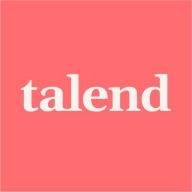

Informatica Intelligent Data Management Cloud (IDMC) and Talend Data Fabric compete in the data integration and management category, offering distinct advantages tailored to different organizational needs. IDMC has a strong lead in integration capabilities and scalability, while Talend is noted for its easy deployment and cost-effective solutions.
Features: IDMC offers broad data integration support, advanced AI-driven data management capabilities, and robust scalability, making it ideal for complex and large-scale operations. Talend Data Fabric provides flexible data integration, high transformation performance, and built-in data quality services, streamlining data processing workflows.
Room for Improvement: IDMC could improve by simplifying its deployment process to match the ease of use found in Talend's offerings. The pricing model could also be more flexible to accommodate smaller businesses. Talend, on the other hand, might benefit from strengthening its AI capabilities and enhancing scalability features to better serve larger enterprises. Additionally, providing more comprehensive integration options to rival IDMC's could enhance its overall offering.
Ease of Deployment and Customer Service: Talend Data Fabric is praised for its straightforward deployment process and responsive customer service. These aspects ensure efficient integration and support. In contrast, IDMC offers a comprehensive rollout with extensive service options but involves a more complex configuration process, which might deter users seeking simplicity.
Pricing and ROI: IDMC demands a higher initial investment but offers significant ROI through its advanced features and scalability, ideal for enterprises with extensive data needs. In comparison, Talend Data Fabric presents a more accessible cost structure with reliable returns, appealing especially to mid-sized operations seeking cost-effective solutions without sacrificing performance.
| Product | Market Share (%) |
|---|---|
| Informatica Intelligent Data Management Cloud (IDMC) | 3.6% |
| Talend Data Fabric | 0.9% |
| Other | 95.5% |


| Company Size | Count |
|---|---|
| Small Business | 42 |
| Midsize Enterprise | 24 |
| Large Enterprise | 134 |
| Company Size | Count |
|---|---|
| Small Business | 4 |
| Large Enterprise | 3 |
Informatica Intelligent Data Management Cloud (IDMC) integrates data quality, governance, and integration with flexible architecture. It supports multiple domains and a data models repository, delivering AI-enhanced data management across cloud-native platforms.
IDMC provides seamless integration and governance capabilities that support diverse data environments. Its comprehensive suite includes customizable workflows, data profiling, and metadata management. AI features, a data marketplace, and performance scalability enhance data management. While its interface poses challenges, its robust matching and cloud-native integration facilities are essential for complex data ecosystems. Users employ IDMC for connecting systems, ensuring data quality, and supporting data compliance but seek better pre-built rules, services, and improved connectivity, especially with platforms like Salesforce. Licensing, cost, and added AI functionalities are areas for potential refinement.
What are the key features of IDMC?IDMC is implemented across industries for data integration, metadata management, and governance. Organizations use it to connect systems, migrate data to cloud environments, and maintain data quality. They manage master data and automate business processes, facilitating data lineage and ensuring compliance with privacy regulations.
Talend, a leader in cloud data integration and data integrity, enables companies to transform by delivering trusted data at the speed of business.
Talend Data Fabric offers a single suite of apps that shorten the time to trusted data. Users can collect data across systems; govern it to ensure proper use, transform it into new formats and improve quality, and share it with internal and external stakeholders.
Over 3,000 global enterprise customers have chosen Talend to help them turn all their raw data into trusted data to make business decisions with confidence — including GE, HP Inc., and Domino’s.
We monitor all Data Integration reviews to prevent fraudulent reviews and keep review quality high. We do not post reviews by company employees or direct competitors. We validate each review for authenticity via cross-reference with LinkedIn, and personal follow-up with the reviewer when necessary.